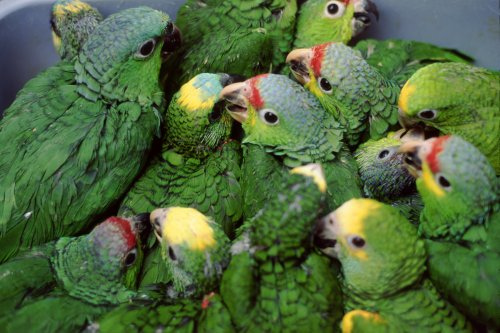I HIGHLY recommend reading and sharing [this impactful piece from HSUS].
Denied Their Natural Habits, Millions of Pet Parrots Lead Bleak, Lonely Lives
by Charles BergmanIntelligent and complex birds often suffer from isolation, boredom, and neglect.
“These parrots are like people—like children,” she says. “It’s like adopting a 2-year-old special needs child. One that will never grow up.”And some can live to over 70 years.
Mass production means packed cages, motherless chicks,
and storage bin nests.
Voren began his business more than 30 years ago when he went to Honduras and South America with a copy of Forshaw’s Parrots of the World. “It was my shopping list. Once I brought in 500 yellow-naped Amazons. I brought in probably the largest shipment of hyacinth macaws to the United States. My memory is 50.” Voren sold the macaws for $20,000 per pair (legal then) and used the money to set up shop, importing other birds to supply the breeding stock.
Since then, Voren says he has produced about 30,000 parrots—1,000 per year.
“Do you have personal relationships with your parrots?” I ask.
“I’m a capitalist,” he says. “I’m in business. No personal relationship with the parrots.” He pauses. “That maybe gives the wrong impression. It’s just that you can’t have a personal relationship with 1,500 adult birds.”
The old breeder parrots are sold at auction. “When a pair reaches the end of their productivity, they go to a broker,” he says, “to be sold to other breeders. Only not with my name on them.”
The image of the baby parrots in the plastic storage boxes has stayed with me. They were not so much parrots as products. Not so much babies as profits with feathers.
PEOPLE ARE SMITTEN WITH BABY BIRDS -
The truth is, they're just lonely and needy.
At captive breeding’s height, he says, maybe 750,000 parrots per year were being produced in the United States. Now that number is maybe 100,000 per year as people learn more and more about how difficult parrots can be in the home.
Cravens has been letting his own parrot-parents follow their “strongest impulse”: raising their offspring themselves. Baby parrots need closeness. In the wild, they’ll spend months and months in constant contact with their parents. But in a factory-style breeding operation, they never see their parents or are removed early on to be raised by people. The result is young parrots who don’t know who they are, who spend their lives in a no-birds land between human and animal.
At first, the young parrots are cuddly and affectionate. “People are smitten,” Cravens says. “They think, ‘Oh, this parrot really loves me, just like a baby.’ And you want to be loved like that. But the truth is, it’s just lonely. It’s needy.”
“All these parrots, the babies, they’re orphans,” he says. “My breeder friends hate it when I say this. But that’s what they are, orphans.”
Simple line of thought:
In a few years the parrot hits puberty and develops intense needs for bonding with a mate. “It gets sexual, and the problems really begin. It may attach to one person in the family and grow hostile to others. It may even bite or attack others. … The parrots become dysfunctional because they have not been allowed to have a childhood.”
What do birds have? Wings.
What do they do with them? Fly.
Who are we to deprive them of that?
Flight is something we as humans dream of, yet feel we have the right to deny those beings that can?
We deny them of their families; babies, parents, flock.
I see breeders tout "Hand-raised baby birds?" Why aren't they parent-raised? It's not fair to the birds.
I can't find any reason to justify breeding for profit.
“What parrots want is flight and flock—two things they’re denied as pets in most homes.”
The ones that are too dependent on humans need to be given the opportunity to live as happily as possible. If that cannot be provided by their family's, it would be wonderful if pet shops would instead find QUALITY homes for second hand birds instead of pumping out new ones.
That baby bird is an orphan. It's parents are looking for it! Why do people insist on creating these scenarios?
I will forever preach this from the mountain tops until no more birds are born to suffer for greed and selfishness.
Call me a
Continue Your Research via HSUS





No comments:
Post a Comment